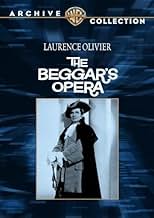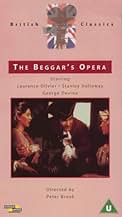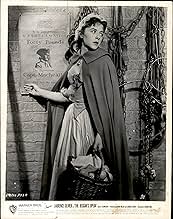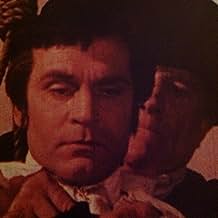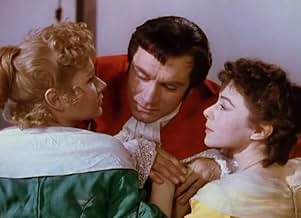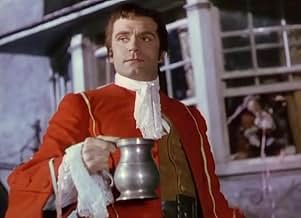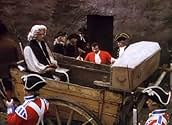IMDb RATING
6.1/10
409
YOUR RATING
When the composer of an opera about a swashbuckling, wenching highwayman meets his hero's real-life counterpart, he's disappointed with his lack of dash.When the composer of an opera about a swashbuckling, wenching highwayman meets his hero's real-life counterpart, he's disappointed with his lack of dash.When the composer of an opera about a swashbuckling, wenching highwayman meets his hero's real-life counterpart, he's disappointed with his lack of dash.
- Director
- Writers
- Stars
- Director
- Writers
- All cast & crew
- Production, box office & more at IMDbPro
Featured reviews
When this movie opened it scarcely caused a ripple in Britain and even less so in the U.S. I don't know why. It's a telling of John Gay's great work written in 1728, and the play was a blockbuster 280 years ago. It's supposed to be the first English "opera" that told a story through song and which was aimed to entertain the people. Gay took melodies wherever he found them, wrote lyrics to them to advance the storyline, and had a hit. And in another version, it still is. The Threepenny Opera by Kurt Weill and Bertolt Brecht (with Blitzstein's redone lyrics) is a fixture in theaters, and Mack the Knife is still a popular song.
Lawrence Olivier plays Macheath, a rollicking highwayman with "wives" all over London. He has two in particular, Polly Peachum, the daughter of his fence, and Lucy Lockit, the daughter of his jailer. The story of Macheath's adventures, captures and escapes are all told in song. There are horse riding songs, love songs, gambling songs, longing songs, lustful songs. The story starts in a London prison where Macheath awaits hanging. A beggar just tossed into the prison has written an opera about Macheath. He starts to tell it to the inmates and the movie takes off.
The songs are great fun and the style of the movie is very much the look of 18th century London. You can feel the fleas in the wigs, the lice in the clothes, the sheen of greasy lips, the stink of unwashed bodies.
And there are some sharp lines. "A miser might as well be satisfied with one guinea as I with one wife." "Love is a misfortune that can happen even to an indiscreet girl." "I can tell by your kiss that your gin is excellent." And when pointing out that consummation needn't wait for marriage, "Friends should not insist on ceremony."
Olivier does a masterful job, handling his own stunts, horse work and, most bravely, his own singing. He's good. On the day of Macheath's hanging, he's carted out to the gallows, sitting jauntily on his casket. While a grim-faced preacher is screaming at him to repent, he's sweeping up wenches to kiss, downing tankards of ale held up to him, and making a little girl laugh while bouncing her on his knee. Olivier plays it with great verve.
And while there's not exactly a reprieve, there is a joyous escape.
If you like Olivier, if you like things British, if you like quirky films that will probably be forgotten, this is worth seeing.
Lawrence Olivier plays Macheath, a rollicking highwayman with "wives" all over London. He has two in particular, Polly Peachum, the daughter of his fence, and Lucy Lockit, the daughter of his jailer. The story of Macheath's adventures, captures and escapes are all told in song. There are horse riding songs, love songs, gambling songs, longing songs, lustful songs. The story starts in a London prison where Macheath awaits hanging. A beggar just tossed into the prison has written an opera about Macheath. He starts to tell it to the inmates and the movie takes off.
The songs are great fun and the style of the movie is very much the look of 18th century London. You can feel the fleas in the wigs, the lice in the clothes, the sheen of greasy lips, the stink of unwashed bodies.
And there are some sharp lines. "A miser might as well be satisfied with one guinea as I with one wife." "Love is a misfortune that can happen even to an indiscreet girl." "I can tell by your kiss that your gin is excellent." And when pointing out that consummation needn't wait for marriage, "Friends should not insist on ceremony."
Olivier does a masterful job, handling his own stunts, horse work and, most bravely, his own singing. He's good. On the day of Macheath's hanging, he's carted out to the gallows, sitting jauntily on his casket. While a grim-faced preacher is screaming at him to repent, he's sweeping up wenches to kiss, downing tankards of ale held up to him, and making a little girl laugh while bouncing her on his knee. Olivier plays it with great verve.
And while there's not exactly a reprieve, there is a joyous escape.
If you like Olivier, if you like things British, if you like quirky films that will probably be forgotten, this is worth seeing.
This was a very enjoyable movie especially if you like period pieces and/or musicals. Hearing Laurence Olivier sing is reason enough to watch this. The cinematography is outstanding and the movie as a whole is very colorful.
Obviously, the song "Mack the Knife" made famous by Bobby Darin, Louis Armstrong and Frank Sinatra is based on this opera/movie. MacHeath is in the opera/movie as is Jenny Diver and Sukey Tawdrey. Louie Miller, Lotte Lenya and Lucy Brown are mentioned in the song (and not in the opera/movie) but, after all, MacHeath was a notorious highwayman and ladies' man.
Obviously, the song "Mack the Knife" made famous by Bobby Darin, Louis Armstrong and Frank Sinatra is based on this opera/movie. MacHeath is in the opera/movie as is Jenny Diver and Sukey Tawdrey. Louie Miller, Lotte Lenya and Lucy Brown are mentioned in the song (and not in the opera/movie) but, after all, MacHeath was a notorious highwayman and ladies' man.
As was said in my review for the 1963 production of the Britten version, John Gay's ballad/satirical opera 'The Beggar's Opera' is a lot of fun and it is no wonder it's popular with most, the dialogue, music and characters are all great. Benjamin Britten's radically different but enormously enjoyable and melodious, an ingenious and often brilliant modern re-imagining that shows the composer's individual treatment of folk-songs, version is also well worth it as well.
This 1953 film may not be completely ideal, but it is still intriguing and entertaining with a good deal to like. Occasionally, some of the dialogue loses impact when director Peter Brook tries to open up the action. While there are wonderful, imaginative visuals, Brook's directorial inexperience shows with some of the drama a bit undistinguished and stagy.
However, 'The Beggar's Opera' (1953) is a very handsome-looking film, with stylish production and costume design and some imaginative photography that succeeds in opening up the action. The music is a superb mix of rousing fun and heartfelt nuance. Most of the dialogue crackles with sharp wit and avoids being too wordy.
Most of the story absorbs and is lively in pacing, with the action being just about easy to follow and the twist is well executed.
Laurence Olivier may not have the best singing voice there is, but has charismatic swagger and energy aplenty. Hugh Griffith, Dorothy Tutin, George Devine and Stanley Holloway give him strong support.
All in all, intriguing and entertaining if not the most ideal version. 7/10 Bethany Cox
This 1953 film may not be completely ideal, but it is still intriguing and entertaining with a good deal to like. Occasionally, some of the dialogue loses impact when director Peter Brook tries to open up the action. While there are wonderful, imaginative visuals, Brook's directorial inexperience shows with some of the drama a bit undistinguished and stagy.
However, 'The Beggar's Opera' (1953) is a very handsome-looking film, with stylish production and costume design and some imaginative photography that succeeds in opening up the action. The music is a superb mix of rousing fun and heartfelt nuance. Most of the dialogue crackles with sharp wit and avoids being too wordy.
Most of the story absorbs and is lively in pacing, with the action being just about easy to follow and the twist is well executed.
Laurence Olivier may not have the best singing voice there is, but has charismatic swagger and energy aplenty. Hugh Griffith, Dorothy Tutin, George Devine and Stanley Holloway give him strong support.
All in all, intriguing and entertaining if not the most ideal version. 7/10 Bethany Cox
The sad fact about "The Beggar's Opera" is that it wasn't directed by Powell and Pressburger. If this had been the case it would no doubt be lauded today as an eccentric masterpiece. It shared the same fate of critical disdain in its time as "Gone to Earth" and "The Elusive Pimpernel" but, unlike these, has still to await an appreciative resurrection. Could it be that it was made by the comparatively little known Peter Brook! And yet with its colourful visual flair and sometimes breathtaking sense of movement it seems right out of the same stable as "The Tales of Hoffmann" and "Oh Rosalinda!". A wonderfully imaginative shot of the landscape viewed from the scaffold gradually blacked out as the prisoner's blindfold is lowered over MacHeath's eyes is perhaps the best example of its inventiveness. For the musical purist it is inevitably something of a curiosity. A fine cast of contemporary singers including Adele Leigh, Jennifer Vyvyan and Edith Coates were assembled to dub the acting cast for the musical numbers, whereas the main role of MacHeath was sung by Laurence Oliver himself, his light baritone voice, although no match for the others, at least serviceable. But, as it works perfectly well, why quibble. (I have little time for those who criticised the "amateur" voices of Woody Allen's delicious musical "Everyone Says I Love You" as they so matched the characters and were not in the least, as has been suggested, unmusical). I watched "The Beggar's Opera" again the other day after a gap of over 50 years and found it just as refreshing. One of the reasons is that many of the tunes are terrific and not one of them goes on for too long. Generally I have to confess that I have little time for filmed musicals. I invariably want the songs to be got over as quickly as possible in order to get on with the action, which I know completely misses the point. With "The Beggar's Opera" I find the reverse to be true, just about resisting the temptation to fast-forward the dialogue to get to the next "tune". Sir Arthur Bliss did a wonderful job of arranging the music specially for the film version although it has to be admitted that the sound quality of the copy transmitted on Sky's Artsworld channel was often muddy and unclear. Would that the soundtrack could be remastered!
John Gay's original Beggar's Opera was a spoof of the high-blown operas of his day. The Olivier film is a spoof of--movie musicals! Sir Laurence sings on horseback; people burst into arias at the worst possible time. The plot goes from the absurd to the absurd. However, if the viewer tries to see it "straight," she will be confused and put off. I don't know why this delightful film is not available on laserdisc or even videotape. Someone should dig it out of the vault and re-introduce it to the world.
Did you know
- Trivia"The Beggar's Opera" is a ballad opera popular during the early eighteenth century, which used the music of popular folk songs, ballads and church hymns set to new lyrics to satirize social customs, mores, and especially Italian opera. It copied the three act Italian operatic format, rather than the then-custom of five acts.
- Quotes
Captain MacHeath: [Hearing a woman singing] Women!... I love the sex!... and a man who loves money might as well be contented with one guinea... as I with one woman.
- Crazy creditsUnusually, the ghost vocalists for the non-singing actors were given billing in the end credits.
- ConnectionsFeatured in Carry on Forever: Episode #1.1 (2015)
Details
Box office
- Budget
- £500,000 (estimated)
- Runtime1 hour 34 minutes
- Aspect ratio
- 1.37 : 1
Contribute to this page
Suggest an edit or add missing content


